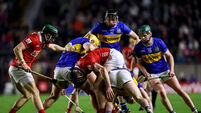Obama is a break from the past, but can he win the real battles to come?
Bush is easily demonised; Obama isn’t
THERE is no doubting where the liberal media stands. With the front page photographs, glowing editorials and slightly breathless radio and TV commentaries, the “Irish for O’Bama” bandwagon has gained huge momentum since Barack’s sensational win in the Iowa caucus last week.
















